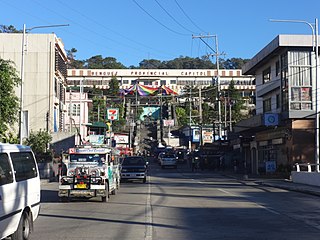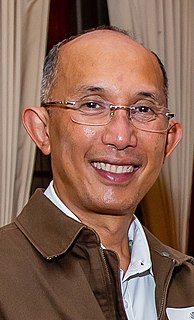
Baguio, officially the City of Baguio, is a 1st class highly urbanized city in the Cordillera Administrative Region, Philippines. It is known as the "Summer Capital of the Philippines", owing to its cool climate since the city is located approximately 4,810 feet above mean sea level, often cited as 1,540 meters in the Luzon tropical pine forests ecoregion, which also makes it conducive for the growth of mossy plants, orchids and pine trees, to which it attributes its other moniker as the "City of Pines".

Benguet, officially the Province of Benguet, is a landlocked province of the Philippines located in the southern tip of the Cordillera Administrative Region in the island of Luzon. Its capital is La Trinidad.

The Fresh Kills Landfill was a landfill covering 2,200 acres (890 ha) in the New York City borough of Staten Island in the United States. The name comes from the landfill's location along the banks of the Fresh Kills estuary in western Staten Island.

Metro is the regional government for the Oregon portion of the Portland metropolitan area, covering portions of Clackamas, Multnomah, and Washington Counties. It is the only directly elected regional government and metropolitan planning organization in the United States. Metro is responsible for managing the Portland region's solid waste system, coordinating the growth of the cities in the region, managing a regional parks and natural areas system, and overseeing the Oregon Zoo, Oregon Convention Center, Portland's Centers for the Arts, and the Portland Expo Center. It also administers the Regional Illegal Dumping Patrol or RID Patrol which is tasked with cleaning up illegal dumping and it is the designated point of contact for citizens to report illegal dumping in the Portland metro area.
Dandora is an eastern suburb in Nairobi, Kenya. It is part of the Embakasi division. Surrounding neighbourhoods called estates include Kariobangi, Baba Dogo, Gitare Marigo and Korogocho. Dandora was established in 1977, with partial financing by the World Bank in order to offer a higher standard of housing.

Ariel Sharon Park is an environmental park established on the former Hiriya waste dump located southeast of Tel Aviv, Israel. After accumulating 25 million tons of waste, the facility was shut down in August 1998. It is visible on approach into Ben Gurion International Airport as a flat-topped hill. Three recycling facilities have been established at the foot of the mountain: a waste separation center, a green waste facility that produces mulch and a building materials recycling plant. The waste dump and its surrounding area have been renovated into a large park that is still under construction.

Kennon Road, also known as Rosario–Baguio Road, is a two lane 33.53-kilometer (20.83 mi) roadway in Benguet province in the Philippines connecting the mountain city of Baguio in Benguet to the lowland town of Rosario in La Union province. The project begun in 1903 and opened for travel on January 29, 1905. Originally called Benguet Road, it was later renamed in honor of its builder, Col. Lyman Walter Vere Kennon of the U.S. Army Corps of Engineers. It is the second oldest road that leads to Baguio, after Quirino Highway, and the shortest route to Baguio for travelers from Manila and provinces in central and southern Luzon.

Mount Cabuyao is a mountain in the Philippines located in the municipality of Tuba in the province of Benguet. Its summit, rising to more than 2,000 metres (6,600 ft) above sea level, overlooks the city of Baguio. It is commonly mistaken as Mount Santo Tomas, a taller mountain just beside it.

The Manila Zoo, formally known as the Manila Zoological and Botanical Garden, is a 5.5-hectare (14-acre) zoo located in Malate, Manila, Philippines that opened on July 25, 1959.
The Payatas landslide was a garbage dump collapse at Payatas, Quezon City, Philippines, on July 10, 2000. A large pile of garbage first collapsed and then went up in flames which resulted in the destruction of about 100 squatters' houses.
The Olinda Landfill is a landfill situated in Orange County, California, west of the northern portion of Chino Hills State Park in Carbon Canyon in Olinda neighborhood of Brea City.

An ecobrick is a plastic bottle packed with used plastic to a set density. They serve as reusable building blocks. Ecobricks can be used to produce various items, including furniture, garden walls and other structures. Ecobricks are produced primarily as a means of managing consumed plastic by sequestering it and containing it safely, by terminally reducing the net surface area of the packed plastic to effectively secure the plastic from degrading into toxins and microplastics. Ecobricking is a both an individual and collaborative endeavour. The ecobricking movement promotes the personal ecobricking process as a means to raise awareness of the consequences of consumption and the dangers of plastic. It also promotes the collaborative process as a means to encourage communities to take collective responsibility for their used plastic and to use it to produce a useful product.

The Aspiras–Palispis Highway is a Philippine major highway in northern Luzon that runs from the city of Baguio in the province of Benguet to the municipality of Agoo in the province of La Union.

Balili River also called Naguilian River is a river in the province of Benguet in the island of Luzon Philippines. With a total length of 62.7 km (39.0 mi) it traverses the city of Baguio, and the municipalities of La Trinidad and Sablan before entering the province of La Union, where it is named the Naguilian River.

Packaging waste, according to the United States Environmental Protection Agency (EPA), defined containers and packaging as products that are assumed to be discarded the same year the products they contain are purchased. The majority of the solid waste are packaging products, estimating to be about 77.9 million tons of generation in 2015. Packaging can come in all shapes and forms ranging from Amazon boxes to soda cans and are used to store, transport, contain, and protect goods to keep customer satisfaction. The type of packaging materials including glass, aluminum, steel, paper, cardboard, plastic, wood, and other miscellaneous packaging. Packaging waste is a dominant contributor in today's world and responsible for half of the waste in the globe.

Waste management in South Korea involves waste generation reduction and ensuring maximum recycling of the waste. This includes the appropriate treatment, transport, and disposal of the collected waste. South Korea's Waste Management Law was established in 1986, replacing the Environmental Protection Law (1963) and the Filth and Cleaning Law (1973). This new law aimed to reduce general waste under the waste hierarchy in South Korea. This Waste Management Law imposed a volume-based waste fee system, effective for waste produced by both household and industrial activities.

Benjamin "Benjie" Bañez Magalong is a Filipino politician and retired police officer serving as the mayor of Baguio since 2019. Before entering politics, he served in the Philippine Constabulary and Philippine National Police (PNP) for 38 years. He was the chief of the Cordillera regional police office, the Criminal Investigation and Detection Group (CIDG), and the Directorate for Investigation and Detective Management (DIDM). He retired with the rank of Police Deputy Director General as the PNP's Deputy Chief for Operations.

The Payatas dumpsite is a former garbage dump in the barangay of the same name in Quezon City, Metro Manila, Philippines.

The COVID-19 pandemic in the Cordillera Administrative Region is part of the worldwide pandemic of coronavirus disease 2019 caused by severe acute respiratory syndrome coronavirus 2. The virus reached the Cordillera Administrative Region on March 20, 2020, when the first case of the disease was confirmed to involve a resident of Manabo, Abra. All provinces, as well as the independent city of Baguio has recorded at least one confirmed COVID-19 case.
The Clark Sanitary Landfill is a dumpsite at the Clark Special Economic Zone in Capas, Tarlac managed and operated by the Metro Clark Waste Management Corp.. It stores and process waste from the Clark area as well as other areas in Central and Northern Luzon.

















